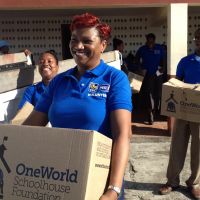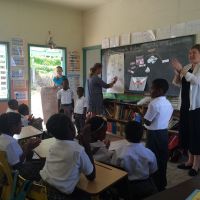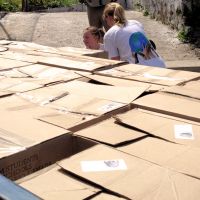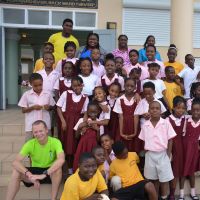Why here?
This program was suspended in 2020 due to COVID-19.
No country can afford to be complacent about illiteracy but it’s clear small nations in this part of the developing world are at tremendous risk. Teachers, parents and local governments tell us OneWorld Schoolhouse is making a difference.
In Canada, several well-funded organizations serve aboriginal communities, including Princes Charities Canada, Frontier College, First Book Canada and the Martin Aboriginal Education Initiative. If you are looking to support literacy here at home, we urge you to support these groups.
However, if you want to make a difference in the Eastern Caribbean, please read on.
There is a global crisis around literacy. And every country is concerned about making sure children have access to literacy. I think we have a real social responsibility… to connect as many people globally as possible to help support one another. And when you have people who are determined to make a difference, I think there is a serious chance of driving change.
Sonya White
THE ISSUE
Here, almost annual hurricanes and a stubborn recession have eliminated most libraries. Not surprisingly, among 15 – 24 year olds – absolute literacy levels have fallen from 87% to 82%.
Date source: UNESCO May 2013
In this landscape, we began in 2011 to donate relevant, recently-used storybooks to schools in St. Lucia, Grenada, Montserrat and Nevis. The goal is to create a library in every school in these countries plus Anguilla, British Virgin Islands, St. Vincent and the Grenadines, and Dominica. To date, we’ve donated over 250,000 books. To review shipments, scroll to the bottom of the page; you’ll see both donor and recipient schools.
I think most of us accept that in today’s world, knowledge is pervasive and ever expanding… what is needed increasingly more in the real world are people who can think, solve problems, create, innovate, imagine and adapt.
The Rt. Hon. Kenny Anthony, Prime Minister of St. Lucia
RAINFOREST OF READING
By 2013 we realized donated books – even recently, well-written ones – can only arrest the damage. For reading to take root, we needed a compelling idea to re-ignite a love of reading. More than philanthropy, we needed marketing.
So, with the inspiration –and permission of the Ontario Library Association’s “Forest of Reading” program – we created the “Rainforest of Reading” Festival in 2013. The festival excites kids, no matter the particular level of reading proficiency. That some parents can’t read has not diminish the kids’ enthusiasm. In three years, participation has grown from 400 kids in one country to 11,000 in four countries.
The festival depends on three unique elements. First, a personal “passport” for every child. The passports “re-position” books as “destinations”. Since most Caribbean kids can’t afford to travel – even to the next island – travel has a tremendous appeal. Second, we invite Canadian and/or American authors and illustrators to come down and meet the kids. Third, we hold a massive, noisy and very engaging national, day-long celebration complete with parades and games in open air venue. The combined effect is finely-tuned fun that reverberates in memory all year long.
THE VALUE OF READING
What change can this new generation of readers offer their communities? The answer is: perspective. Research tells us fiction is indispensable to compassion-building, critical thinking, and problem-solving. But crucially, reading fiction gives children – especially those living below the poverty line – a wider view of themselves and the future.
We think our reading festivals are innovative for several reasons:
- Teachers receive professional development to guide them through the process and explain best practices. Reading occurs simultaneously in every classroom.
- Rainforest of Reading passports are proof that a child belongs to the world of stories. Children respond in word and pictures to 12 books. Answers enable “accountable talk”.
- We immerse kids in the idea of stories by bringing authors and illustrators to run workshops with kids.
- Being a citizen of the Rainforest of Reading creates an immediate sense of belonging for all readers and a vital link to the wider world of other readers.
To browse all festivals by year or country click on the Rainforest of Reading logo at the top of this page.
HOW WE ARE BUILDING SUSTAINABILITY
We are building sustainability by:
- working in co-operation with local governments.
- identifying “champions”. In St. Lucia, Governor General Pearlette Louisy, is our Patron and is an advocate for literacy renewal.
- engaging business people, parents and local Peace Corps volunteer at festival celebrations.
- measuring success. On Day One of the festival all teachers record an anonymous student survey to measure reading habits and attitudes. Annual results are consolidated by grade, school, and country. Data is given to all Ministries of Education.
- maintaining a volunteer program that brings Ontario primary school students to help at festivals each year.
OUR FINANCES
Our annual budget ($225,000) is funded through a broad base of individual charitable giving. Financial support from Caribbean businesses pays for much of our on-site expenses.
No one at the foundation draws a salary; we’re 100% volunteer-based. You can view our most recent financial statements at: Canada Revenue Agency
FUTURE GROWTH
Antigua & Barbuba and St. Vincent & the Grenadines have expressed their desire to join us in 2017. We plan to invite all OECS countries by 2020 but donations dictate the speed at which we can satisfy these goals.
WHERE DO WE GO FROM HERE?
The capacity to be thrilled, the possibility to act on dreams – this is what donated books and Rainforest of Reading festivals bring to its “citizens.” Literacy in the Caribbean is as fragile as anywhere in the world. We assume these tourist-based economies are more prosperous than they really are. But being so close to North America these islands are too easily forgotten. We hope you will recognize our work as worthy of your support.









